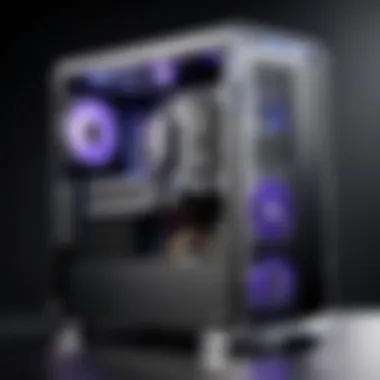Exploring the Intricacies of an Average Gaming PC: A Comprehensive Analysis


Esports Coverage
When it comes to exploring the realm of gaming PCs, delving into esports coverage can provide valuable insights into the industry's competitive landscape. Pro-gaming tournaments, where elite players showcase their skills and strategies, serve as a benchmark for the capabilities of gaming PCs. Player profiles and interviews offer a glimpse into the preferences and requirements of top gamers, shedding light on the hardware needed for peak performance. Additionally, analyzing team strategies and gameplay techniques can highlight the importance of optimized hardware configurations.
Hardware Testing
In the quest to dissect the essence of an average gaming PC, hardware testing plays a crucial role. Reviews of gaming monitors offer an in-depth evaluation of display quality, refresh rates, and color accuracy, factors that significantly impact the gaming experience. Performance analysis of GPUs delves into frame rates, rendering capabilities, and thermal efficiency, vital aspects for seamless gameplay. Comparisons of mechanical keyboards examine features like key switches, actuation force, and ergonomic design, determining their suitability for gaming purposes.
Game Reviews
Understanding the gaming landscape involves keeping abreast of the latest releases and their performance on average gaming PCs. Detailed gameplay analysis dissects mechanics, controls, and optimization, crucial for assessing hardware compatibility. Evaluating storyline and graphics reviews offers a holistic view of a game's immersive qualities and visual fidelity, essential for gauging the demands placed on gaming systems. By scrutinizing these aspects, gamers can make informed decisions on selecting titles that align with their PC specifications.
Introduction
In the realm of gaming PCs, understanding the intricacies of an average setup is crucial for enthusiasts and novices alike. This article embarks on a journey to unravel the essence of an average gaming PC, shedding light on its components, performance benchmarks, and overall value proposition. By meticulously delving into the core elements of a standard gaming rig, readers will gain a holistic perspective on what defines a typical gaming PC.
Delving deeper, this exploration not only serves as a guide but also as a foundational knowledge base for those venturing into the world of gaming PCs. From the processing power to graphics capabilities, each aspect plays a significant role in shaping the gaming experience. Recognizing the significance of comprehending these components is the first step towards constructing a gaming setup tailored to individual preferences and requirements.
An average gaming PC represents a blend of performance, efficiency, and cost-effectiveness. By uncovering the nuances of each component, readers can navigate the plethora of options available in the market with informed decision-making. The synergy between various parts of a gaming PC culminates in a unified system that not only meets but surpasses the expectations of gamers, delivering an immersive and seamless gaming experience.
As we delve further, intricacies such as CPU processing capabilities, GPU architecture, RAM capacity, storage options, and cooling systems will be dissected to provide a comprehensive understanding of the key elements that determine the performance and efficiency of an average gaming PC. This article aims to enlighten readers on the importance of each component and how they collectively contribute to enhancing the overall gaming experience. Stay tuned as we journey through the core components of an average gaming PC, decoding the essence of each element and its impact on gaming performance.
The Basics of an Average Gaming PC
When we delve into the realm of average gaming PCs, understanding the basics is fundamental. The Central Processing Unit (CPU), Graphics Processing Unit (GPU), and Random Access Memory (RAM) are the cornerstone components that determine a system's performance and capabilities. Each element plays a crucial role in ensuring a smooth gaming experience with optimal graphics, speed, and responsiveness. By examining these components in detail, we can appreciate their significance in shaping the overall gaming experience.
Central Processing Unit (CPU)
Importance of CPU in Gaming
The CPU serves as the brain of a gaming PC, handling tasks ranging from basic calculations to complex gaming processes. Its importance lies in its ability to execute instructions swiftly, impacting a game's performance, speed, and overall responsiveness. Choosing a high-quality CPU can significantly enhance gaming experiences by ensuring smooth gameplay, minimal lags, and efficient multitasking capabilities. Popular options like Intel and AMD offer cutting-edge processors tailored to meet the demands of modern gaming, balancing power efficiency with impressive clock speeds and core counts. Understanding the nuances of CPU performance is crucial for optimizing gaming setups and achieving peak gaming performance.
Popular CPU Brands
When it comes to choosing a CPU for gaming, renowned brands like Intel and AMD stand out for their innovation and market leadership. Intel processors are synonymous with top-tier performance and reliability, catering to gaming enthusiasts seeking uncompromising power and speed. On the other hand, AMD's Ryzen series has gained popularity for its excellent price-to-performance ratio, making it a preferred choice among budget-conscious gamers. Both brands offer a diverse range of processors suited for various gaming requirements, ensuring a seamless gaming experience tailored to individual preferences. Exploring the features and capabilities of these leading CPU brands can guide gamers in selecting the most suitable option for their gaming rigs.


Graphics Processing Unit (GPU)
GPU Architecture
The GPU is a crucial component responsible for rendering visuals, textures, and effects in games, enhancing graphical fidelity and immersion. Its architecture plays a pivotal role in determining a GPU's performance, efficiency, and rendering capabilities. Modern GPUs utilize advanced architectures designed to deliver realistic graphics, high frame rates, and seamless gameplay experiences. Selecting a GPU with a well-optimized architecture can elevate gaming visuals to new heights, enabling gamers to experience intricate details, vibrant colors, and smooth animations in their favorite titles.
Performance Impact in Gaming
An efficient GPU can significantly impact gaming performance by delivering enhanced visuals, faster frame rates, and smoother gameplay. The GPU's performance directly influences a game's graphics quality, rendering speed, and overall immersion, making it a critical component for immersive gaming experiences. By understanding the performance implications of different GPU models, gamers can make informed decisions when selecting a graphics card that meets their gaming expectations and requirements. Optimizing GPU performance is essential for maximizing gaming immersion and maintaining competitive edge in online gaming scenarios.
Random Access Memory (RAM)
Role of RAM in Gaming
RAM plays a vital role in gaming by providing quick access to essential game data, ensuring smooth performance and seamless multitasking. Its capacity and speed directly impact a system's ability to handle multiple tasks simultaneously, reducing loading times and improving overall responsiveness. Investing in adequate RAM can elevate gaming experiences by enabling faster game loading, smoother gameplay, and efficient data processing. Understanding the critical role of RAM in gaming setups is essential for optimizing performance and ensuring peak system responsiveness.
Recommended RAM Capacity
While the role of RAM is pivotal in gaming, determining the ideal RAM capacity for a gaming PC is crucial for achieving optimal performance. Recommended RAM capacity varies based on factors such as game requirements, multitasking needs, and future-proofing considerations. Striking a balance between sufficient RAM capacity and budget constraints is essential for building a gaming setup that delivers exceptional performance without overspending. By evaluating the recommended RAM capacity for gaming setups, users can fine-tune their systems to deliver a seamless gaming experience tailored to their specific gaming preferences and requirements.
Storage Options
When delving into the world of an average gaming PC, one cannot overlook the paramount significance of Storage Options. In the realm of gaming PCs, the choice between Solid State Drives (SSD) and Hard Disk Drives (HDD) is a pivotal decision that directly impacts the overall performance and user experience. Storage Options play a crucial role in not only storing game data but also in enhancing loading times, system responsiveness, and overall efficiency. Gamers often face the dilemma of choosing between the speed of SSDs and the affordability of HDDs, making this topic a critical aspect of any discussion surrounding gaming PCs.
Solid State Drives (SSD) vs. Hard Disk Drives (HDD)
Speed and Capacity Comparison
When comparing SSDs and HDDs in terms of speed and capacity, SSDs emerge as the frontrunners due to their flash-based storage that allows for faster read and write speeds. SSDs excel in loading times, booting up the system, and launching applications swiftly. The absence of moving mechanical parts in SSDs contributes to their impressive speed and responsiveness, making them an ideal choice for gamers seeking seamless performance. On the other hand, HDDs, although slower in speed compared to SSDs, offer larger storage capacities at a more affordable price point, making them suitable for storing a vast library of games and files without breaking the bank.
Impact on Gaming Performance
The choice between SSDs and HDDs significantly impacts gaming performance. SSDs elevate the gaming experience by reducing load times, minimizing in-game stutters, and enhancing overall system responsiveness. Games installed on SSDs exhibit smoother gameplay, faster level transitions, and improved reliability, providing a competitive edge to gamers. In contrast, HDDs may lead to longer load times, slower system boot-ups, and potential latency issues during gameplay, affecting the fluidity and immersive nature of gaming sessions. Understanding the impact of SSDs and HDDs on gaming performance is crucial for gamers looking to optimize their gaming setup and elevate their overall gaming experience.
Display and Resolution
In the intricate world of an average gaming PC, the topic of display and resolution plays a crucial role in enhancing the overall gaming experience. The display quality and resolution directly impact visual clarity, detail, and smoothness during gameplay, making it a vital consideration for any gaming setup. In this section, we will delve into the specific elements of display and resolution that significantly influence gaming performance and user enjoyment.


Monitor Specifications
Refresh Rate and Response Time
Refresh rate and response time are critical aspects of monitor specifications that greatly affect how images are displayed on the screen. The refresh rate, measured in Hertz (Hz), signifies the number of times per second the display refreshes the image. A higher refresh rate results in smoother motion visuals, reducing motion blur and enhancing overall gameplay fluidity. On the other hand, response time refers to how quickly pixels can change colors, impacting the speed at which transitions occur. Low response times minimize ghosting effects, ensuring sharper image quality during fast-paced gaming sequences. The combination of a high refresh rate and low response time is ideal for competitive gaming, providing a seamless and responsive viewing experience.
Resolution Options
When discussing monitor specifications, the resolution setting is a critical factor that determines the level of detail and clarity in on-screen graphics. Resolution denotes the number of pixels displayed horizontally and vertically on the screen, with higher resolutions offering sharper images and text. Common resolution options include Full HD (1920x1080 pixels), Quad HD (2560x1440 pixels), and Ultra HD or 4K (3840x2160 pixels). Each resolution option presents a trade-off between visual fidelity and hardware performance requirements. While higher resolutions deliver stunning visuals, they demand more graphical processing power, potentially affecting gaming performance. It is essential to balance resolution preferences with GPU capabilities to optimize both visual quality and smooth gameplay.
Cooling Systems and Thermals
In this section, we will dissect the crucial role of cooling systems and thermals in the context of an average gaming PC. Proper cooling is paramount in ensuring the longevity and optimal performance of computer components, especially under heavy gaming loads. Effective thermal management helps prevent overheating, which can degrade hardware and compromise gaming experience. When it comes to selecting a cooling system for a gaming PC, there are two main options to consider: air cooling and liquid cooling.
Air Cooling vs. Liquid Cooling
Efficiency and Noise Levels
Air cooling relies on fans to dissipate heat from the CPU and GPU heatsinks. While it is generally more affordable and easier to install compared to liquid cooling, air coolers can produce more noise, especially under high workloads. On the other hand, liquid cooling systems use coolant loops to transfer heat away from components, offering superior thermal performance and quieter operation. Liquid coolers also provide better temperature regulation, making them popular among users aiming for overclocking or silent gaming setups.
Thermal Management
Thermal management is a critical aspect of maintaining a stable temperature within a gaming PC. By efficiently dissipating heat generated during gaming sessions, thermal management systems contribute to the overall longevity and reliability of computer hardware. A well-designed thermal solution is essential for preventing thermal throttling, a phenomenon that reduces performance due to excessive heat buildup. Factors such as airflow design, heat sink effectiveness, and thermal paste quality play significant roles in effective thermal management. Users must balance thermal performance with noise levels when choosing cooling solutions to maximize gaming experience and hardware lifespan.
Power Supply Unit (PSU)
In the realm of gaming PCs, the Power Supply Unit (PSU) stands out as a fundamental component that often gets overlooked. Essential for delivering power to all internal hardware components, the PSU plays a crucial role in ensuring the stability and longevity of the system. When considering building or upgrading a gaming rig, selecting a reliable and suitable PSU is paramount to prevent hardware failures and optimize performance.
PSU Efficiency and Wattage
Choosing the Right Wattage
When delving into the intricate process of choosing the appropriate wattage for a PSU, meticulous attention to detail is imperative. The wattage of a PSU directly influences the system's power capabilities, impacting its overall performance and efficiency. Opting for a wattage that aligns with the power requirements of the components is essential to prevent underpowering or overpowering the system, both of which can lead to detrimental consequences.
In the context of this article focused on the essence of an average gaming PC, emphasizing the significance of selecting the right wattage is crucial. By matching the PSU’s wattage to the system's power demands, users can ensure stable operation and avoid any potential damage to the hardware. Balancing power needs with efficiency allows for optimal energy utilization, promoting a sustainable and reliable gaming setup.


Energy Efficiency Ratings
Discussing the energy efficiency ratings of a PSU sheds light on its environmental impact, operational cost, and long-term sustainability. Energy efficiency ratings, typically denoted by certifications such as 80 PLUS, indicate how effectively a PSU converts electricity from the wall outlet into usable power for the components.
In the scope of this article's exploration of the average gaming PC, energy efficiency ratings hold immense relevance. Highlighting the benefits of opting for a PSU with higher efficiency ratings, such as reduced electricity bills and minimized heat production, aligns with the theme of maximizing performance while minimizing environmental footprint. Understanding these ratings empowers users to make conscious choices that benefit both their gaming experience and the planet.
Peripheral Connectivity
Unveiling the nuances of peripheral connectivity sheds light on the critical role that USB ports, audio inputs, and networking interfaces play in the functionality and usability of an average gaming PC setup. USB ports serve as the gateway for connecting various peripherals like keyboards, mice, and other accessories, ensuring seamless integration and data transfer. Audio inputs, including headphone jacks and microphone ports, contribute to an immersive gaming experience, allowing crisp sound output and clear communication during gameplay. Networking interfaces, such as Ethernet and Wi-Fi connectivity, are indispensable for online gaming, offering stable and high-speed internet connections for lag-free gaming sessions.
USB Ports, Audio Inputs
USB ports and audio inputs are the unsung heroes of gaming peripherals, providing the essential links between the user and the PC. The versatile nature of USB ports accommodates a wide range of devices, from gaming controllers to external storage drives, amplifying the functionality of the gaming setup. Likewise, audio inputs enable users to connect headphones, microphones, and sound systems, ensuring crystal-clear audio quality and communication within the gaming environment. The strategic placement and abundance of USB ports and audio inputs on a motherboard enhance accessibility and convenience for gamers, contributing to a seamless and enjoyable gaming experience.
Networking Interfaces
Delving into the realm of networking interfaces unveils the crucial role they play in maintaining a stable and reliable internet connection for online gaming. Ethernet ports deliver fast and consistent network connectivity, minimizing latency and ensuring smooth gameplay for competitive gaming scenarios. Wi-Fi interfaces provide users with the flexibility of wireless connectivity, allowing gamers to move freely without being tethered to a physical connection. Understanding the nuances of networking interfaces empowers gamers to optimize their online gaming experience, ensuring a competitive edge and uninterrupted gameplay sessions.
Gaming Peripherals and Accessories
Gaming peripherals and accessories play a pivotal role in enhancing the overall gaming experience on an average gaming PC. These components, ranging from keyboards, mice to headsets, offer a direct interface for gamers to interact with the virtual world, making them crucial for esports enthusiasts, technology aficionados, and gaming fanatics alike.
Keyboards, Mice, and Headsets
When it comes to gaming peripherals, keyboards, mice, and headsets are indispensable tools that can significantly impact a player's performance.
Customization Features
Customization features in gaming peripherals allow users to tailor their devices to suit their unique gaming style. This adaptability can enhance comfort during long gaming sessions, improve efficiency, and cater to individual preferences. Notable customizations include programmable keys, adjustable DPI settings on mice, and customizable RGB lighting options, providing users with a personalized gaming experience.
Ergonomics and Durability
Ergonomics and durability are essential considerations when selecting gaming peripherals. Ergonomic designs ensure comfort and reduce strain during extended gaming periods, promoting optimal performance. Durable construction materials, such as high-quality plastics or metals, increase the longevity of the peripherals, making them a worthwhile investment for avid gamers. While ergonomic features enhance user comfort, durability guarantees prolonged and reliable use, contributing to an overall satisfying gaming experience.
Final Thoughts on the Average Gaming PC
In summarizing the essence of an average gaming PC, it is crucial to underscore the significance of a holistic approach towards gaming rig construction. After dissecting components such as CPUs, GPUs, RAM, storage options, display specifications, cooling systems, power supply units, motherboards, and gaming peripherals, one arrives at a pivotal juncture - the final thoughts on the average gaming PC. These reflections serve as the culmination of a meticulous exploration into the intricate functioning of a gaming setup. By aggregating insights from each component discussed in preceding sections, readers can glean a comprehensive understanding of what characterizes a standard gaming PC.
The discussions around the final stage - final thoughts on the average gaming PC - are pivotal in asserting the importance of synergy among the components. It is not merely about the individual capabilities of CPU, GPU, RAM, or storage; rather, it is the symbiotic relationship between these elements that harmonizes to yield optimal performance. Delving deeper into complexities such as thermal management, power efficiency, and peripheral customization, one realizes that the crux lies in how these components interplay and complement each other in the gaming ecosystem.
Moreover, while diving into the realm of final reflections on the average gaming PC, considerations expand beyond raw performance metrics. Factors like user experience, longevity of the system, upgradability prospects, and overall investment value come into play. For enthusiasts seeking an immersive gaming journey, the final thoughts encapsulate not just the technical prowess of the rig but also its practicality and adaptability to evolving gaming trends.
Therefore, the ultimate takeaway from this comprehensive guide to gaming PCs is to view the rig as a sum of its parts, where final thoughts serve as a compass guiding enthusiasts towards a balanced, efficient, and future-proof gaming setup. Understanding the nuances of harnessing the potential of each component while harmonizing them towards a unified gaming experience is what imbues the average gaming PC with its essence - a blend of power, performance, and precision tailored to satiate the gaming aspirations of tech-savvy individuals.



